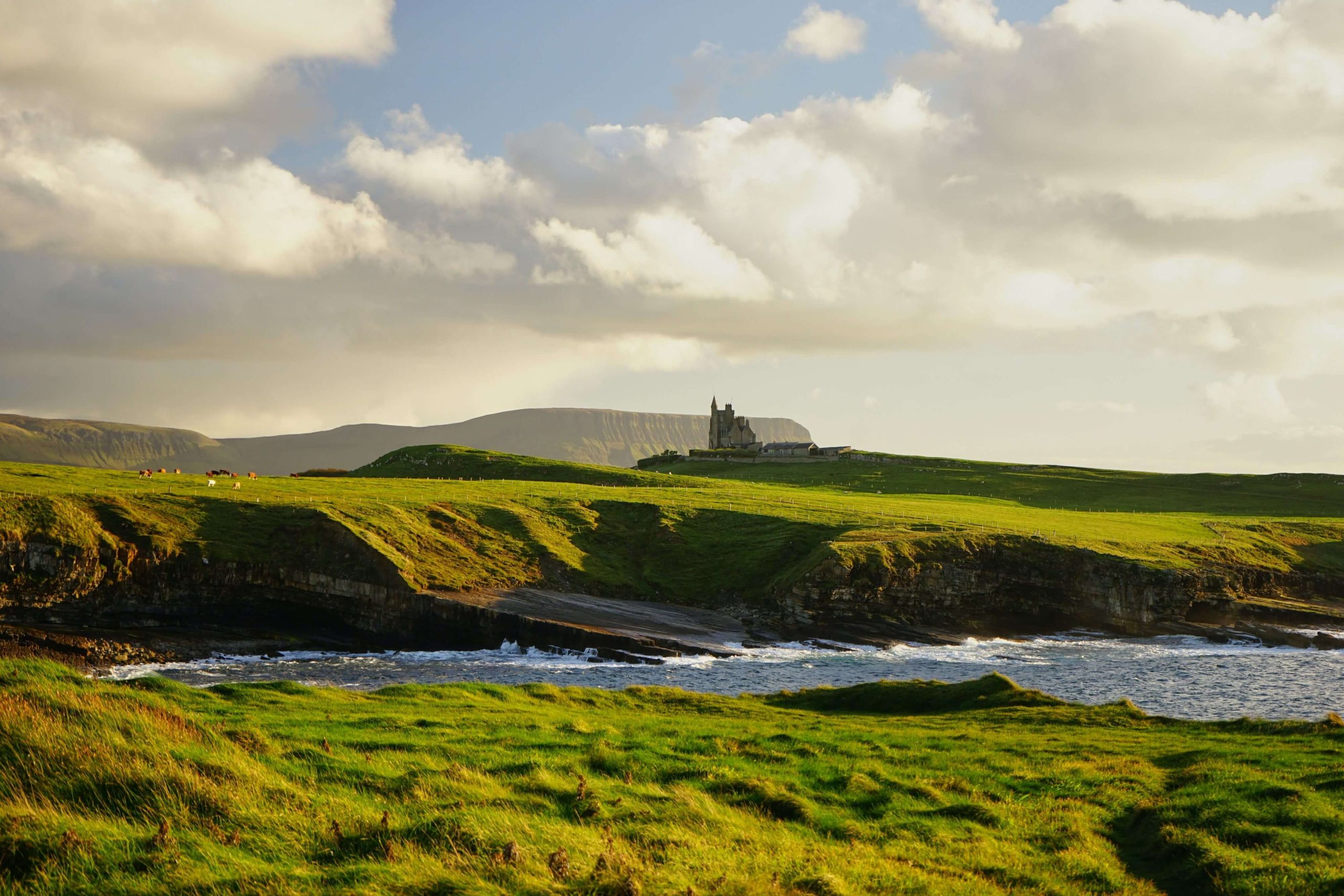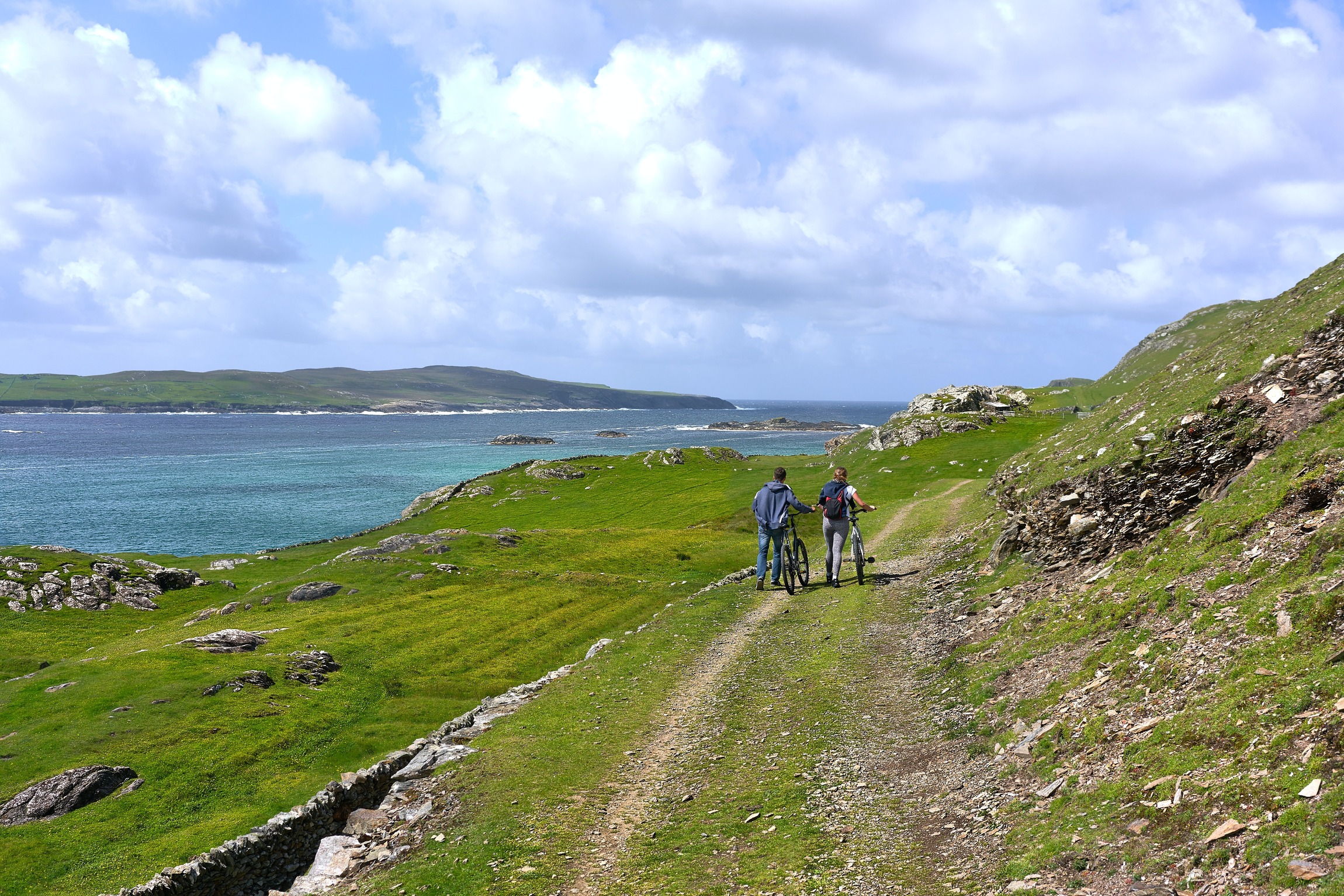About Ireland
The Republic of Ireland offers a high quality of life, with a strong sense of community and a welcoming atmosphere. Ireland’s vibrant cities, stunning landscapes, and rich cultural heritage provide a unique backdrop for both work and pleasure.
With its robust economy and diverse career opportunities, Ireland is an attractive destination for individuals and families looking to build a rewarding and balanced life.

Geography and landscape of Ireland
Ireland’s geography blends rugged coastlines (like the Cliffs of Moher or Beara Peninsula), verdant countryside (for example, Glenveagh National Park and the Ring of Kerry), and tranquil woodlands (such as Dromore Woods or Glendalough). From the dramatic seascapes of the west to picturesque lakes like Lough Corrib and Lough Neagh, the pervasive presence of water continues to shape Ireland’s natural beauty and ecosystems, as well as providing a prime experience for sports enthusiasts.
In the countryside, the landscape is marked by a patchwork of agricultural fields divided by ancient stone walls and hedgerows. Quiet villages and rustic cottages dot the landscape, adding to the rural charm. The moderate climate means that the lush greenery is maintained year-round, making it an ideal place for those who appreciate a connection to nature.
Ireland’s biggest cities
The total population of the Republic of Ireland (ROI) is over 5 million, spread over four provinces that are split into 26 counties (many of which are mainly rural). The main cities in the Republic of Ireland are:
- Dublin: Ireland’s capital city is in the province of Leinster on the east coast (over 1.5 million inhabitants including the suburbs).
- Cork: Located in Munster province on the south Atlantic coast of Ireland (220,000 inhabitants).
- Limerick: Also located in Munster province, Limerick is the main city of Ireland’s Mid-West Atlantic (100,000 inhabitants).
- Galway: In Connacht province on the west Atlantic coast of Ireland (85,000 inhabitants).
- Waterford: The third-largest city in Munster, Waterford is located on the south-east Atlantic coast (60,000 inhabitants).
The island of Ireland comprises the Republic of Ireland and, to the north, Northern Ireland (which is part of the United Kingdom). With a population of 1.5 million, Northern Ireland is in the province of Ulster, which has six counties and two large cities – Belfast and Derry.
Climate of Ireland
Like its people, Ireland’s weather is never boring or predictable. It is often said that you will experience all four seasons in one day in Ireland. Our climate can be described as temperate maritime, influenced primarily by the Atlantic Ocean and the Gulf Stream. This results in relatively mild temperatures and a fair amount of precipitation throughout the year. Summers are generally mild, with temperatures ranging from 15°C (60°F) to 20°C (70°F), while winters are cooler but rarely severe – typically ranging between 5°C (40°F) and 8°C (46°F).
Despite its reputation for being rainy, Ireland’s moderate climate also offers plenty of fine, sunny days, particularly in the late spring and early autumn.

Irish Culture and Heritage
Ireland is a society that values its past while embracing modernity, so you will find that rich culture and heritage are woven into the fabric of daily life. Known for its literary giants, traditional music, and vibrant arts scene, Ireland offers a deep well of cultural experiences – from places to visit to a packed events calendar. The country’s long history is reflected in its ancient monuments (for example, Newgrange and Brú na Bóinne), Gaelic traditions, and the strong sense of community that permeates both rural and urban areas.
Languages in Ireland
English and Irish (Gaeilge) are the official languages of the Republic of Ireland. Although Irish is taught in school, only a small percentage of the population speaks Irish as their first language.
In everyday situations and at work, English is the language people use, and you will find that people use UK English rather than US English rules when it comes to spelling, vocabulary, and usage.
Lifestyle and Irish society
The Irish are known for their friendliness and hospitality, creating a welcoming environment for newcomers. Whether in a bustling city or a peaceful village, Irish society offers a pace of life that is both relaxed and fulfilling, with a focus on quality of life that is hard to match.
Ireland scores well for international standards of living and wellbeing surveys. It is an increasingly multicultural society, with approximately 1.15 million inhabitants having been born abroad.
Economy and innovation
Ireland is a global leader in innovation, particularly in sectors such as technology, pharmaceuticals, life sciences, and finance. It ranks very high for economic freedom and gross domestic product (GDP) per capita.
The country’s strong and open economy is supported by a favourable business environment, a highly skilled workforce, and a commitment to fostering creativity and entrepreneurship. This dynamic economic landscape provides ample opportunities for professional growth and success, with a low unemployment rate.
Overall, Ireland offers an affordable cost of living compared to other European countries.
Education and Learning
Ireland boasts a robust education system with world-class universities and research institutions. From early education to advanced degrees, Ireland offers a supportive environment for personal and professional development with a strong emphasis on critical thinking, creativity, and practical skills. R&D in third-level institutions is supported by significant investment in research infrastructure, strong collaborations between academia and industry, and a robust support system for innovation.
These institutions are highly regarded for their research output, particularly in fields like pharmaceuticals, biotechnology, information technology, and engineering.
Tourism and leisure
Ireland is known for its warmth and hospitality, and over 10 million people visit the country every year. The Irish are proud of their heritage and eager to share their stories, music, and cultural treasures with guests. Whether exploring ancient castles, enjoying the buzz of vibrant city centres, or hiking through untouched wilderness, there is always something new to discover.
The country’s rich cultural calendar covers everything from music festivals to sporting events, ensuring there is never a dull moment. Ireland’s appeal as a travel destination means there are also countless leisure opportunities available to its residents.
Living in Ireland
Ireland is part of the European Union as well as the Common Travel Area (an open border area comprising the United Kingdom, Ireland, the Isle of Man and the Channel Islands). It is also one of the closest European countries to the USA and Canada. Three international airports and four ferry ports keep Ireland connected to Europe and the rest of the world. It is a safe country with excellent health and social care as well as great public services such as public transport, education, utilities and infrastructure, and emergency services.